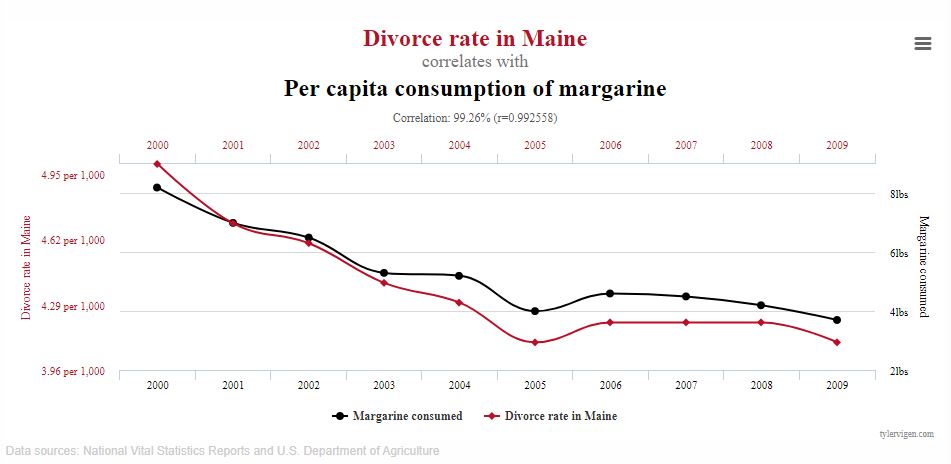You may be old enough to remember other claims using similar kernels of scientific truth that became popular diet fads; cigarettes, grapefruit, cabbage. the Adkins diet, Paleo.
Now we have similar mysticism about our microbiome, epigenetics, and probiotics, all of those buzzwords is the Mediterranean diet. Epidemiologists use a lot of fancy terms for what is simple statistical correlation; if you want to find a new miracle food, survey a bunch of people about their health, survey them about what they eat, and see what is in common. If you have enough of the former and enough of the latter, you say the latter caused the former. (1)
Population statistics are rarely useful for individual diets
The field of study which looks for patterns to try and correlate food or chemicals or anything else to outcomes is called epidemiology. Epidemiology is a portmanteau of Greek words which together mean 'study of people' and it originated when science was ready to start tackling epidemics. It was important to find out the risk factors and that meant studying how people behaved or what physical things they might have in common.
It sounds simple enough but its definition has changed so much singe its origin in the late 19th century that even epidemiologists have a hard time comparing to apples today. The one key thing the public cares about, risk factors, are rarely detailed in 2020, instead epidemiologists find a "hazard" and ignore dose and rush to publish a paper claiming your car seat is a carcinogen or that "ultraprocessed" foods make people fat.
Epidemiology had a big win - smoking - and the resulting fame caused a surge in popularity. We didn't do human clinical trials of smoking, that would be unethical, it was epidemiologists who found overwhelming evidence that smoking kills people. But there is only one smoking and one alcohol and one plutonium, once those were set epidemiologists began to start linking nearly every food and popular chemical to longevity or early mortality. They did that by ignoring dose, the risk factor that is more important than hazard. The International Agency for Research on Cancer (IARC), which bills itself as the most important epidemiology group in the world, uses five orders of magnitude for dose in its epidemiology claims. That means 1 shot of scotch to them is the same as drinking 10,000 shots. The public knows it is ridiculous but we're told to trust science so states like California abdicated common sense and make being on an IARC list automatic inclusion for Proposition 65 warning labels.
That's now over 900 compounds yet not a single life has been saved since Prop 65 was implemented and began scaring the public over trace chemicals.

Epidemiology is a language of science, like math. Using math as a language, you can create time travel, but that doesn't mean it can happen in the real world and epidemiology findings are also "exploratory" - they may be an interesting statistical link between X and Y, but scientists will have to determine if they are really related in an 'X causes y' way.(2)
That has worked in cases like BPA, where despite an overwhelming consensus showing it cannot be an endocrine disruptor companies began to remove it due to public concerns manufactured by activists. And before that it worked with trans fats.
If you remember New York City Mayor Mike Bloomberg claiming that the city needed to ban trans fats to prevent diabetes, you see how epidemiology can go awry. Some epidemiologists claimed it was the trans fats - popularized after the previous generation of epidemiologists said animal fat needed to be replaced with vegetable oil - that caused type 2 diabetes and Mayor Bloomberg jumped on it.(3) Obesity is caused by eating a whole lot of pies and donuts. It is caused by too many calories. Instead of noting the calories of pies and donuts, Mayor Bloomberg claimed it was the trans fats in the pies. Government then set out to ban trans fats - in everything except pies and donuts. Which is all you need to know about government nutrition recommendations.
He found nutrition epidemiologists to back him up because correlation can back you up on anything, pro- or con. There was once a widespread belief that smoking was why people were thin - their population evidence was that people who quit smoking often got heavier. They ignored all addiction behavior, a gigantic null hypothesis anyone in science could see.
Not having a valid null hypothesis plagues a giant chunk of food and chemical epidemiology today. It is instead food and lifestyle surveys and with enough rows and columns, you are guaranteed to find something to link to something, you just have to be willing to dredge.
Statistical woo using "linked to" "associated with" and "suggests" has become so abused a whole website has become devoted to spurious correlations.

If you saw an article claiming divorces in Maine are linked to margarine consumption, you would be rightly skeptical. Yet the data are right there, just like you can link atrazine to harm in frogs or formaldehyde in wood flooring to the number of daughters born in America. The difference in more arcane claims is that people don't know the jargon, the way everyone knows what margarine and divorce are.
The Mediterranean Diet is as valid as a smoking weight loss program is - just ignore confounders
The Mediterranean Diet craze has its origin in the 1950s, when Dr. Ancel Keys, an oceanographer (and biologist) from Berkeley, set off decades of cholesterol panic by comparing the diet of poor people in southern Italy - plants, olive oil, fish - with that of wealthy people in New York and their population-level health outcomes. He made some sense to casual readers; if you go back in history, gout was a disease of the wealthy. Poor people never got it because it occurred in people who ate a lot of rich, sweet foods. Poor people also ate very little meat.(4)
If I sold you a magic rock and said it would prevent bear attacks (5), you would see through that but when couched in jargon it was entirely plausible that being poor meant living longer. Except that is not true at all.
The work of keys resonated with people who wanted to believe. Vegetarians claimed they were healthier, poor people could rationalize that too much meat was bad anyway. Now these constituencies are so entrenched that if papers debunk the suspect claims,
meat became the bad thing. Cholesterol bizarrely became a risk factor for a risk factor for heart disease and in the 1990s the Mediterranean Diet craze we all now know took off. But no one wants to live like 1950s Italian peasants so confounders were ignored and the search was on for the magic ingredient that led to healthy living. In the 1990s, the magic ingredient in the Mediterranean diet was red wine - Mediterraneans drink wine and everyone would embrace a diet of more alcohol - but once resveratrol was exposed for being the nonsense everyone outside media, epidemiologists, and diet books knew it was, proponents had to pivot. The pivoting has pointed to nuts, fish oil, and now even the olive oil.
So what if 70 percent of olive oil may be fake, including in Mediterranean homes, it's on a lot of food frequency questionnaires, enough to check off that p < .05 box that has been fetishized by food claimants.
Olive oil may be irrelevant, despite it being the basis of the paper
The new paper endorsing how poor Italians ate in 1950 says it may be the olive oil. The problem - olive oil may not even be an adjuvant, it may just be coincidence, the way the pizza box is not making you fat just because you can find a trace of a chemical in it.
The authors tout the olive oil in the "Mediterranean" food but the real effects were seen in people who also exercised, intermittent fasted, and dieted. In other words, people who are more fit live longer. Sometimes more fit people use olive oil, especially where the whole industry exists. It is like correlating cheese to healthy people in Wisconsin and arguing it is the GMO rennet involved that makes it healthy. It is such a spurious correlation it's silly.
These papers are going to continue to be published until journalists stop repeating them. When that stops happening, when media start recognizing that mouse and epidemiology studies are only exploratory and not reason for alarm, books will stop being written about these fads, and then people will stop asking for funding to bolster the claims.
Until then, we may have to read that"ultraprocessed" foods make people fat - with statistical significance - but don't think that's science.
NOTES:
(1) Just like anthropology has some cultural kooks who went into the field to do evangelism and then people who do very fine work, let's separate activist food and chemical epidemiologists from people who work on things like infectious disease and have terrific value.
(2 Harvard School of Public Health has been criticized for this behavior since the 1980s but it was only a few months ago, when more neutral experts criticized their evangelism of the vegetarian diet, that their behavior was exposed. They were busted trying to get the paper retracted before it was published, spamming the editor with robot complaints, and trying to get a District Attorney to investigate the journal. Then people who have made their careers using food questionnaires to claim meat is killing us took to smearing journalists who reported on the new findings.
(3) Diabetes still went up so he then went after Big Gulps because, you guessed it, someone told him high fructose corn syrup was unnatural and caused diabetes. What they did not tell him is that HFCS has the same fructose as all-natural honey.
(4) True also in ancient Rome. The rich ate a lot of fried food, both fish and meat, while the poor were provided rations of bread and half a pound of olives and olive oil a month along with salted fish. They only got meat during celebrations. They lived longer because there was no real medicine and the rich were far less active, along with being far more gluttonous. There is a reason all of those old paintings had fat people. They were not considered more beautiful, they were the ones with the money.
(5) When a bear wanders around a neighborhood in California, it makes national news, with one group saying humanity is a plague that stole bear homes and another claiming we are at risk from black bears getting in our swimming pools."The Simpeons" spoofed the anti-bear hysteria of 1996 in the "Once Apu About Nothing" episode, using the specious reasons that sells the Mediterranean Diet and miracles supplements to ward off Alzheimer's:
HOMER: Well, there's not a bear in sight. The Bear Patrol must be working like a charm.
LISA: That's specious reasoning, Dad.
HOMER: Thank you, honey.
LISA: By your logic I could claim that this rock keeps tigers away.
HOMER: Oh, how does it work?
LISA: It doesn't work. It's a stupid rock.
HOMER: Uh-huh.
LISA: But I don't see any tigers around here, do you?
HOMER: Lisa, I want to buy your rock.
If it was a brown bear, some caution is warranted, but those have not been seen in California for a long time (if they were really brown bears back then, the recent bear in the news looks brown in color, but is a black bear. And if a moose is walking toward you, leave. They are jerks.



Comments